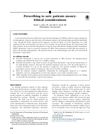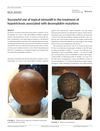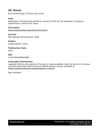 1 citations,
November 2020 in “Journal of The American Academy of Dermatology”
1 citations,
November 2020 in “Journal of The American Academy of Dermatology” GSK-36 downregulation with UTMD improves plaque stability in atherosclerosis treatment.
 January 2020 in “Current trends in diagnosis & treatment”
January 2020 in “Current trends in diagnosis & treatment” The review suggests doctors should carefully weigh risks and benefits of off-label drug use, involve patients in decisions, and calls for better regulations and monitoring.
 3 citations,
January 2015 in “Social Science Research Network”
3 citations,
January 2015 in “Social Science Research Network” The conclusion is that off-label drug use can lead to important medical discoveries and improve patient care.
 6 citations,
September 2012 in “Our Dermatology Online”
6 citations,
September 2012 in “Our Dermatology Online” Retinoids are effective for various skin conditions and hair loss but have serious side effects, so low doses are recommended.
 5 citations,
May 2022 in “Molecules”
5 citations,
May 2022 in “Molecules” Botulinum toxin is effective for various skin conditions, but more research and awareness of side effects are needed.
 January 2024 in “SAGE Open Medical Case Reports”
January 2024 in “SAGE Open Medical Case Reports” Minoxidil can help increase facial hair growth.
October 2024 in “Journal of Dental Sciences” Effective treatments for discoid lupus erythematosus are needed, as current options are unsatisfactory and off-label.
 June 2023 in “International journal of biology, pharmacy and allied sciences”
June 2023 in “International journal of biology, pharmacy and allied sciences” New medications are improving depression treatment, emphasizing accurate diagnosis and chronic care.
 1 citations,
February 2022 in “JAMA Dermatology”
1 citations,
February 2022 in “JAMA Dermatology” Minoxidil and finasteride are FDA-approved treatments for male hair loss, but off-label use of oral minoxidil, dutasteride, and higher doses of finasteride and minoxidil is increasing.
 October 2021 in “Cosmoderma”
October 2021 in “Cosmoderma” Hair loss can be managed with treatments like minoxidil, finasteride, and others, but there are still gaps in effectiveness and off-label usage is increasing.
 2 citations,
March 2018 in “Journal of The American Academy of Dermatology”
2 citations,
March 2018 in “Journal of The American Academy of Dermatology” Doctors should prescribe cheaper, off-label medication and teach patients how to use it to save money ethically.

Onabotulinumtoxin-A effectively treated a painful scalp condition when other treatments failed.
 22 citations,
March 2000 in “Clinics in Dermatology”
22 citations,
March 2000 in “Clinics in Dermatology” Many treatments for hair loss lack proper testing and FDA approval, so their effectiveness is uncertain.
 28 citations,
May 2013 in “The Journal of Steroid Biochemistry and Molecular Biology”
28 citations,
May 2013 in “The Journal of Steroid Biochemistry and Molecular Biology” Testosterone therapy can improve sexual desire and function in postmenopausal women but should be used cautiously and not based solely on testosterone levels.
 1 citations,
October 2023 in “Dermatology and therapy”
1 citations,
October 2023 in “Dermatology and therapy” Some treatments for severe hair loss work but often have side effects, with baricitinib showing the most promise.
 1 citations,
August 2019 in “Pediatric dermatology”
1 citations,
August 2019 in “Pediatric dermatology” Topical minoxidil helped an 8-year-old boy with a genetic hair disorder grow hair.
 September 2020 in “Acta Scientific Cancer Biology”
September 2020 in “Acta Scientific Cancer Biology” Personalized treatment based on detailed tumor analysis successfully managed and reduced the patient's aggressive hair follicle cancer.
September 2022 in “Chinese Journal of Dermatology” Low-dose oral minoxidil can effectively treat hair loss.
21 citations,
March 2018 in “JEADV. Journal of the European Academy of Dermatology and Venereology/Journal of the European Academy of Dermatology and Venereology” 5-alpha-reductase inhibitors may help stabilize or slow down hair loss in some frontal fibrosing alopecia patients, but more research is needed to confirm their effectiveness and safety.
 17 citations,
August 2015 in “Expert Opinion on Pharmacotherapy”
17 citations,
August 2015 in “Expert Opinion on Pharmacotherapy” The document concludes that oral finasteride and topical minoxidil are effective for genetic hair loss, while other treatments for different types of hair loss show promise but need more research.
 4 citations,
January 2022 in “Dermatologic Therapy”
4 citations,
January 2022 in “Dermatologic Therapy” Tofacitinib was found to be a safe and effective treatment for hair regrowth in patients with alopecia areata.
 1 citations,
July 2024 in “Journal of the European Academy of Dermatology and Venereology”
1 citations,
July 2024 in “Journal of the European Academy of Dermatology and Venereology” Oral dutasteride is effective and safe for treating frontal fibrosing alopecia.
 1 citations,
January 2023 in “Research Square (Research Square)”
1 citations,
January 2023 in “Research Square (Research Square)” A woman's vitiligo improved with tofacitinib treatment, and her skin color remained even after stopping the medication, but there are concerns about cancer risk.
 September 2022 in “Hair transplant forum international”
September 2022 in “Hair transplant forum international” JAK inhibitors like baricitinib are a new FDA-approved treatment for alopecia areata, but safety data is incomplete.
 9 citations,
January 2014 in “Dermatology online journal”
9 citations,
January 2014 in “Dermatology online journal” Bimatoprost 0.03% helps grow eyebrow hair.
 6 citations,
April 2016 in “PubMed”
6 citations,
April 2016 in “PubMed” The review found that women using hair loss drugs like finasteride and dutasteride rarely reported sexual side effects.
 January 2025 in “Expert Opinion on Pharmacotherapy”
January 2025 in “Expert Opinion on Pharmacotherapy” Dutasteride is more effective than finasteride for hair loss but may affect male fertility and should be used cautiously.
8 citations,
November 2017 in “Current problems in dermatology” Cancer treatments targeting specific cells often cause skin problems, which can affect how much medicine patients can take.
 2 citations,
October 2021 in “Indian Journal of Plastic Surgery”
2 citations,
October 2021 in “Indian Journal of Plastic Surgery” The best treatments for slowing down pattern hair loss are minoxidil and finasteride, with some other drugs and hair transplantation also used.
 99 citations,
July 2017 in “Clinical Reviews in Allergy & Immunology”
99 citations,
July 2017 in “Clinical Reviews in Allergy & Immunology” New treatments for Alopecia Areata show promise but need to be more effective and affordable.


























